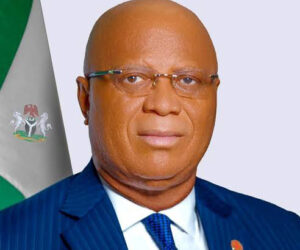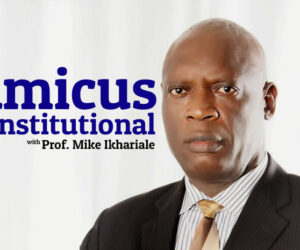1
“Legislators have the first place in the temple of glory; conquerors come behind them.” – Voltaire, 1694-1778, VANGUARD BOOK OF QUOTATIONS, VBQ, p 126.
Voltaire, the French philosopher, was writing at the dawn of history of democracy; and at a time and country elected representatives of the people actually went into parliament to represent them. Nigeria today and the legislators at Federal, State and Local governments can mostly not be said to “have the first place in the temple of glory”. Yet, unless our elected officials rise up to the levels expected of lawmakers in a democracy, all the efforts aimed at developing Nigeria will end nowhere. Hopefully, we still have a chance.
Seldom have I commented on the elected members of the National Assembly, NASS and for a very good reason. Almost all of those elected either into the Senate or House of Representatives have left no footprints on the sands of their times in the hallowed chambers. Perhaps the worst example since 1999 was from Lagos State. The fellow was elected three times without sponsoring or co-sponsoring a bill in twelve years. He was frequently absent and would attend sessions only to announce “I concur!” – after being briefed by others who had worked diligently on the bill. Lagos Boy is not different from the majority. I was conscious of his lack of interest because he was from my state. A former Governor, elected to the Senate from one of the South East states was just as bad.
Nigeria’s legislators since 1979
“Those who do not remember the past are condemned to repeat it.” – George Santayana, 1863-1952, VBQ p 93.
I was away in the US from 1964 to 1974 – when Nigeria went from democracy to military dictatorship. The ten years constituted a learning period, not only in my fields of study, but in governance in a democracy; citizens participation and most importantly, the role of the Media. All these despite the fact that I was not yet interested in Media. Yet, I read widely, as if my life depended on it. Back in Nigeria, I quickly realized that my life, indeed the lives of all Nigerians, depend absolutely on having good leaders elected at all levels. The chance to participate came in the 1979 Elections.
Despite growing up in America, I believed then, and still believe now, that the Presidential system was too expensive for a relatively poor country. But, it was better than military dictatorship. May be later we would have a chance to change it. At least, I understand how this system works. Elected Senators were Nigerian Senators.
I did not join a political party; but, I was partisan in a liberal way. To me President Shehu Shagari should be supported to govern well and the opposition should provide alternatives to government policies. Democracy suffered a quick retreat during the Second Republic, 1979-1983, because legislators collectively and individually failed to live up to expectations. I was in Akure on the night that late Colonel Sani Abacha announced the coup which ended Shagari’s government. Drinks were still being served round when soldiers came to drive us home; but not before I told everybody that we would live to regret what happened that night.
The Third Republic ended sooner than the Second; and there is nothing on record to demonstrate any sort of parliamentary leadership conveying glory on the lawmakers of the era.
The Fourth Republic has been the longest, and I earnestly pray that, despite its numerous faults, it will not go down history like the first three. As a columnist since 1987, it has been possible for me to follow the activities of the NASS since 1999. To be candid, the performances of each period have been underwhelming. Failure to live up to the high standards of great parliaments elsewhere started early.
Thousands of books and articles have been written about the functions of parliamentarians. Every constitution defines their roles in great details. It is not my intention to throw the entire library at readers. Three primary roles are however paramount and those mandatory assignments define every lawmaker. Sometimes, they are forced to take very tough positions when clashes of interests occur. Federal lawmakers represent the country; they must also serve the interests of their constituencies at the state level; while at the same time promoting the interest of their political party and being absolutely loyal to the President. More than the wisdom of Solomon is required to walk all these tight ropes without derailing. Abundant Divine grace is indispensable at all times. Pleasing everybody is out of the question. Yet, there are a few politicians who manage to do it with relative ease.
Why Dr. Kalu and why now?
“Against great excellence in another, there is no way of defending ourselves except love” – Goethe, 1749-1832, VBQ p 51.
My attention was drawn to Dr Benjamin Kalu recently when somebody mentioned that he was serving his second term in the House of Representatives and was solely responsible for sponsoring 40 bills during his first term, 2019-2023, in the NASS; that right now he had been involved in about 120 bills – that amounts to an astonishing three bills every two months. Granted, not all of them have been passed by the NASS and signed into law, but one thing is indisputable. The current Deputy Speaker of the Federal House of Representatives is not only discharging his responsibilities to the country excellently well; he is also leading by example.
To be sure about what is being written, I made more enquiries about him through a veteran media person in the North East whose brother is a PDP member in the House. I wanted to know what his colleagues in the opposition thought of his leadership style. Despite a late night call, there was a response.
According to the legislator, “Dr Kalu exemplifies what is lacking in most politicians in Nigeria today. He practices politics without bitterness; he is humble; does not talk down to fellow members and is a good listener. Even, when he disagrees with you, the exchange is still mostly polite.”
That testimonial has pointed to why the Deputy Speaker has been so successful in getting things done in the House of Representatives. At only 54 years old, he has packed a lot of achievements into those years – which most people 70 and above will envy.
Certainly, the future of Nigeria hangs on leaders like Kalu who have forged lasting relationships across religious, ethnic and regional boundaries and who are also God-fearing; while serving their fellow Nigerians.
If Nigeria is ever going to have a future, we need to have more lawmakers who will take their jobs seriously and attend to lawmaking. In part two, I will provide evidence of how Dr Kalu has emerged as the legislator living up to the ideals expected of lawmakers everywhere in the world.
To be continued….
WHY NEGOTIATING WITH BANDITS WILL NEVER WORK
“Every time you negotiate with terrorists, you become an accomplice.”
Governor Mohammed Bago of Niger State last week said: “The State has reached a point where the people must stand up and defend themselves because ransom will only turn kidnapping into a thriving business.
“I will not negotiate with bandits. I will not pay ransom. The moment we start paying, they will open shop on our heads and continue kidnapping people. The situation has reached a state of war that requires collective resistance.” – VANGUARD, October 23, 2025.
Pity Governor Bago. He had tried appeasement, which is another synonym for negotiation under duress. It didn’t work. The original subscribers to negotiations were former Governors of Kaduna, Katsina and Zamfara; when Buhari was mismanaging the tragedy. Each settlement invariably resulted in new demands – once the money collected upfront is exhausted.
There is a fundamental reason negotiations and ransom payments don’t work; just as rehabilitation is a waste of time. Most bandits probably have no fixed address and no work or business. Releasing them into their communities, apart from making no sense, raises the questions: how would previously traumatized communities receive a former bandit granted amnesty and returned to them? Without any means of self-employment, how long before he returns to the bush? What are the penalties for failing to comply with the terms of reprieve?
Chicken-hearted Governors cause the problem.
“I am also against capital punishment; let the murderers start by stopping it.”
Nigerian Governors are uniformly chicken-hearted. None of them wants to sign an Execution Order. They leave murderers until somebody springs them loose or they escape from prison custody. Absolute nonsense.
Follow me on Facebook @ J Israel Biola







